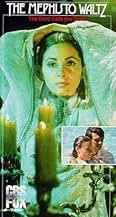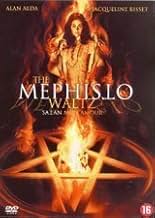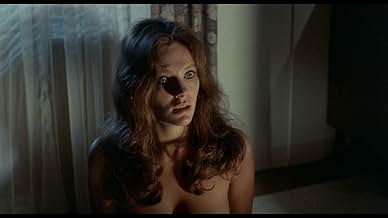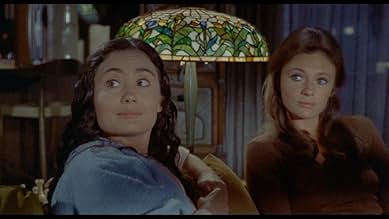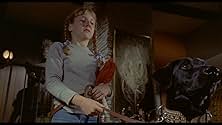VALUTAZIONE IMDb
6,1/10
3477
LA TUA VALUTAZIONE
Aggiungi una trama nella tua linguaAn old, dying satanist arranges to transfer his soul into the body of a young concert pianist.An old, dying satanist arranges to transfer his soul into the body of a young concert pianist.An old, dying satanist arranges to transfer his soul into the body of a young concert pianist.
- Regia
- Sceneggiatura
- Star
- Premi
- 1 candidatura in totale
Bradford Dillman
- Bill Delancey
- (as Brad Dillman)
Curd Jürgens
- Duncan Ely
- (as Curt Jurgens)
Berry Kroeger
- Raymont
- (as Barry Kroeger)
Terrence Scammell
- Richard
- (as Terence Scammell)
Leon Alton
- Pallbearer
- (non citato nei titoli originali)
Antoinette Bower
- Member of Ely's Group
- (non citato nei titoli originali)
Recensioni in evidenza
This 1971 movie is definitely worth seeing, at least for a melancholically superb Jacqueline Bisset (at the same time, the other main character, Alan Alda, offers a lousy and histrionic performance). Even if it may seem obsolete, the movie still gives one chills down the spine at some moments, and the end is maybe a recognition of the fact that Evil is always more tempting than the Good. All in all, the old Faustian theme is well depicted in this movie, with some interesting arabesques (but why do the Satan worshipers speak a terrible French in their rituals - that I do not know, a superb score (naturally, since it is about the world of pianists and music) and some subtle meditations about the condition of the artist today and always. 7/10
At least two people below comment on the frequent appearance of the boom mike in this film. To clarify, that is the fault of the TV company / Video company for screening the film in the wrong aspect ratio. It is not the fault of the filmmakers. If you saw this film in the cinema there would be no boom mike since the top of the frame would be masked off by the lens gate. The TV company is showing you the full frame of the picture which should not be all visible to the audience.
The first indication that this is going to be a science fiction/fantasy film is the fact that Alda is married to Bisset! Doubtful..... They play a relatively happy couple who become embroiled into the lives of an eccentric concert pianist (Jurgens) and his rather creepy daughter (Parkins.) As Alda continues to find himself in the world of the very rich and very indulgent Jurgens, Bisset realizes that something is very wrong. It seems that Jurgens wants to (with a little help from Satan) put his soul into Alda's body. (It is emphasized that it's due to his incredible piano hands, not for any other esoteric things that Alda has to offer......though, truthfully, this is probably about the best Alda ever looked.) Though Alda gets top billing, this is really Bisset's story as she tries to navigate the world of the devil cult before they can set their sights on her daughter who is next on the list of conquests. These transformations are punctuated by the appearance of a dab of Wisk detergent on the receiver's forehead. (Oddly, no one in the film seems to particularly want to be Bisset, who is one of the most glorious women ever to be seen on film, even if here her hair is a bit fly-away and she wears little make-up.) The film has a sort of souped-up TV movie quality to it, no doubt due to the producer Quinn Martin who created so many memorable 1960's and 1970's TV series. It's just a retread of the more popular (and better done) "Rosemary's Baby". Here, the director doesn't take the time to make the coven of worshippers memorable, even though they are played by familiar character actors in most cases, and they are hardly utilized at all. It's difficult to work up much familial concern for Alda, Bisset and their daughter Ferdin since they are hardly ever seen together. Ferdin, after one initial glimpse, is mostly just referred to until later in the movie. Alda gives a very sedate performance for the most part. He seems horribly miscast. Bisset does pretty well until the ridiculous ending throws the movie off it's track. Parkins is good as the icily evil daughter. She and Jurgens share a memorably disturbing kiss. Widdoes tries to bring dimension to the standard best friend role. Dillman (oddly billed as "Brad") does a decent enough job as Parkins' former husband. Jerry Goldsmith provides a nerve-jarring score which is sometimes a bit too over the top for it's own good. It's fun to watch in a kitschy way. (Check out those main titles!) Moss Mabry has some fun with the costuming at times (notably at a risque costume ball.) There's also a convincingly nasty little dog that Bisset has to contend with. All in all, an enjoyable enough film for a mild shock or two and some creeps, but by no means is it a great film.
A good plot similar to HP Lovecraft's "The thing on the doorstep" without the "innsmouth look" of Asenath but with the body swapping of devil worshippers attempting an eternal leapfrog through history using others bodies . Violence is kept to a minimum the required evil for this horror is amply supplied by absentee devil who's decadent servants plot and dissemble to increase their own worth , chilling dreams of the blue wax applying witches are the best moments. Alan Alda's performance was believably naive and overshadowed by a masterful and compelling kurt jurgens dry self absorbed and above the pettiness of his guests . Miss Blisset charming, beautiful ."The Ninth gate" , "The night of the demon" may be better films but would happily keep company on the same shelf.
It is important in film-making not only create an impression but also to engender some sort of gut reaction from the audience, especially in horror films. We can judge a horror film in addition to its style, by its ability to actually frighten. THE MEPHISTO WALTZ does well on this count.
The film is about a couple who is coerced into the household of rich socialite-Satanists, led by Duncan Ely, who is played by Curt Jurgens, who is pretty good here. What follows is a deadly game of cat-and-mouse between the converted and unconverted to Ely's sect. It is pretty well-written and shot, with genuine suspense and a deceptively simple use of oblique angles and soft focus to create a nightmarish atmosphere. The problem with the film is that it is too long, and domestic sequences are not poignant enough to be interesting, despite the strange Alda performance.
However, there are scary sequences of fantasy vs. reality and terror-based ideas, such as Jaquelin Bisset's realization that her dreams are reality and the pure horror of the dog attack scene. Initially director Paul Wendkos's inserts seem too jarring, but in being jarring they make the action more threatening.
I didn't really like the title sequence because it gives away too many of the nice shots we should be surprised or thrilled by later in the film. One thing that definitely adds to the suspense of the film is Jerry Goldsmith's score: it rivals Herrman's PSYCHO score for violin-fueled, full-blooded accompaniment to a horror film.
Overall, despite some problems of character development and loose ends, THE MEPHISTO WALTZ is a frightening film, and a devious twist on a concept used in such other films as THE SEVENTH VICTIM and ROSEMARY'S BABY, this one is a distinctive experience in the bizarre. Some may not like the plot's convolution, but assuredly watch if you are a fan of horror films of any connotation.
The film is about a couple who is coerced into the household of rich socialite-Satanists, led by Duncan Ely, who is played by Curt Jurgens, who is pretty good here. What follows is a deadly game of cat-and-mouse between the converted and unconverted to Ely's sect. It is pretty well-written and shot, with genuine suspense and a deceptively simple use of oblique angles and soft focus to create a nightmarish atmosphere. The problem with the film is that it is too long, and domestic sequences are not poignant enough to be interesting, despite the strange Alda performance.
However, there are scary sequences of fantasy vs. reality and terror-based ideas, such as Jaquelin Bisset's realization that her dreams are reality and the pure horror of the dog attack scene. Initially director Paul Wendkos's inserts seem too jarring, but in being jarring they make the action more threatening.
I didn't really like the title sequence because it gives away too many of the nice shots we should be surprised or thrilled by later in the film. One thing that definitely adds to the suspense of the film is Jerry Goldsmith's score: it rivals Herrman's PSYCHO score for violin-fueled, full-blooded accompaniment to a horror film.
Overall, despite some problems of character development and loose ends, THE MEPHISTO WALTZ is a frightening film, and a devious twist on a concept used in such other films as THE SEVENTH VICTIM and ROSEMARY'S BABY, this one is a distinctive experience in the bizarre. Some may not like the plot's convolution, but assuredly watch if you are a fan of horror films of any connotation.
Lo sapevi?
- QuizHas the singular distinction of being the only theatrical film produced by Twentieth Century-Fox during the entire calendar year of 1970, this due to financial reversals incurred by the studio when several of its recent films failed at the box office.
- BlooperAt various points during the film, the demonic potion bottle varies between a clear glass bottle partially filled with blue liquid and a blue glass bottle in which the liquid cannot be seen.
- Citazioni
Duncan Ely: People should be born at the age of 70 and live their life backwards.
- Versioni alternativeAn alternate cut of The Mephisto Waltz ran on the Flix network in the early-mid 2000s. This version includes two memorable differences: a much longer floor shot close up of the Doberman's head wearing the Halloween mask, and a shot of Satan's hooves when he visits Paula Clarkson (Jacqueline Bisset) during her Satanic ritual.
- ConnessioniFeatured in Cinemacabre TV Trailers (1993)
I più visti
Accedi per valutare e creare un elenco di titoli salvati per ottenere consigli personalizzati
- How long is The Mephisto Waltz?Powered by Alexa
Dettagli
- Data di uscita
- Paese di origine
- Lingue
- Celebre anche come
- The Mephisto Waltz
- Luoghi delle riprese
- Avenue of the Stars, Century City, Los Angeles, California, Stati Uniti(Paula Clarkson walking over bridge in Century City)
- Azienda produttrice
- Vedi altri crediti dell’azienda su IMDbPro
- Tempo di esecuzione1 ora 55 minuti
- Colore
- Proporzioni
- 1.85 : 1
Contribuisci a questa pagina
Suggerisci una modifica o aggiungi i contenuti mancanti

Divario superiore
By what name was La macchia della morte (1971) officially released in India in English?
Rispondi



